Tuesday 26 July 2022 2:29pm
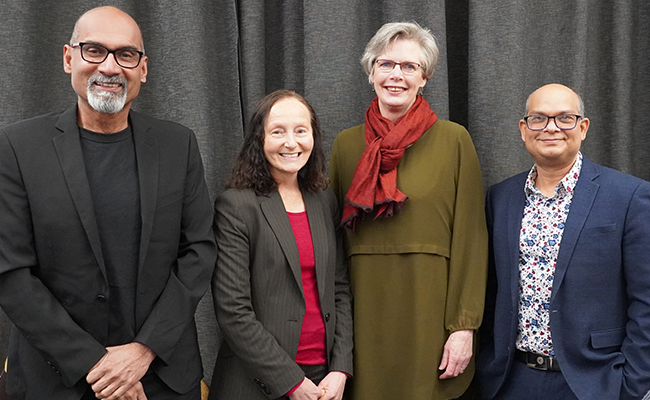
From left, Associate Professor Vijay Mallan, Associate Professor Helen Roberts, Associate Professor Gisela Sole and Associate Professor Shyamal Das.
Three more University of Otago supervisors have gained United Kingdom Council of Graduate Education (UKCG) certification.
Associate Professor Vijay Mallan from the Higher Education Development Centre (HEDC) was the first person outside of the United Kingdom to gain the certification, last year.
Now, Associate Professor Shyamal Das, of the School of Pharmacy, Associate Professor Gisela Sole, of the School of Physiotherapy and Associate Professor Helen Roberts, of the Department of Accountancy and Finance, join him.
Other supervisors outside the UK have since received certification also, but Otago has the highest number of UKCGE certified supervisors in a university outside the UK.
The newly certified trio each had to submit a 5000-word-long portfolio about their supervisory practice.
It needed to included details such as how they recruited students, supported students with developing research competencies and also how they supported personal, professional and career development. They had to include aspects of how they developed supervisory relationships with the candidates and with co-supervisors. They also had to reflect upon their practices based on the scholarly literature on doctoral supervision.
Students’ success is his priority
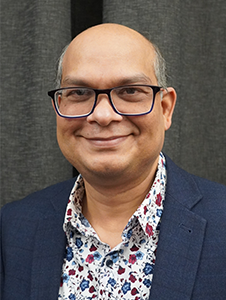
Associate Professor Shyamal Das
Associate Professor Das says supervision is an important part of his life and he spends a “huge amount” of time doing it.
He believed his supervision practises were of a good standard, and that he was having a positive impact on young researchers.
His students nominated him for the Otago University Students’ Association’s (OUSA) Supervisor Award several times, and in 2017, he won the ‘Supervisor of the Year for the Health Sciences Division’ Award.
When Associate Professor Mallan told him about the application process for UKCGE recognition, he discussed it with his past and current students who encouraged him to apply.
While writing his 5000-word document he reflected upon his work as a supervisor, looking at things he had done well, what his talents were and how he had overcome any issues.
He read almost 30 academic papers on best practices within supervision, and as he read, his interest increased: “This was the best part of my applying for this certification”.
Since starting at Otago in 2013, Associate Professor Das has had four PhD students complete their studies. All were offered positions in prestigious universities and the pharmaceutical industry.
“They have learned quality research, published in top ranked journals and started having a real impact.”
He is currently supervising four PhD students, and has also supervised 19 honours and Masters students.
Since many of his PhD students are international students, Associate Professor Das ensures they receive social support from the time they are accepted into his group.
‘Having done my PhD as an international student, I know how important it is to have social and cultural support in a new country and environment.’
He has also supervised students with 10 co-supervisors.
He says every supervisor is different, but he gives students a lot of time, and it was fulfilling to know he was doing the right thing – not just in his eyes, but in the eyes of the UKCGE as well.
“If you survive the PhD, you can survive life.”
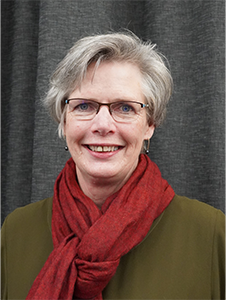
Associate Professor Gisela Sole
Associate Professor Sole says she encountered a couple of challenging supervisor situations that presented “real issues that I needed to deal with”.
These challenges left her with “this image of myself not being a good supervisor”. She asked Associate Professor Mallan what she should do, and he suggested she invite past and present master’s and PhD candidates to fill out a supervisor evaluation, and seven responded.
“Their responses blew me away. They were absolutely excellent and made me quite tearful when I saw them,” Associate Professor Sole says.
Associate Professor Mallan subsequently encouraged her to apply for UKCGE certification.
Associate Professor Sole, who has supervised 11 PhD students as primary or co-supervisor over the past 15 years, says compiling her portfolio was probably one of the best exercises she’d done.
It taught her confidence is the core of supervision – confidence of the supervisor’s role in the team, the supervisory team, and of the students.
Physiotherapists refer to the ‘therapeutic alliance’, which acknowledges the alliance between patient and clinician is crucial for outcomes. The same could be said for supervisory teams, she says.
“The core of a successful PhD is not so much the candidate’s capability and skills, but also the relationship with the supervisory team.”
All supervisors, primary and co-supervisors, had a role to play. The primary supervisor needs to smooth over any disagreements between supervisory team members to ensure discussions remain professional.
Students can find conflicting feedback – which is a reality of life and research - confusing initially, so the primary supervisor needs to guide them through so the process becomes normal.
Building up candidate’s confidence needs to start at day one as doing a PhD is tough and a “mini lesson in life.”
“If you survive the PhD, you can survive life.”
Throughout their PhD project, students will encounter many ups and downs and setbacks.
“Over time, as researchers, we know that setbacks happen. But if it happens for the first time, it can be soul destroying.”
Getting turned down for grant applications, manuscripts getting knocked back, students have to deal with a constant series of trials, she says.
“Building resilience and confidence is absolutely crucial.”
Associate Professor Sole feels support for candidates is well signposted and readily available, which is great, but supervisors at times also require support, particularly when things go pear-shaped.
She was happy to contribute her support to other supervisors or mentor younger supervisors.
Hopes recognition will inspire others
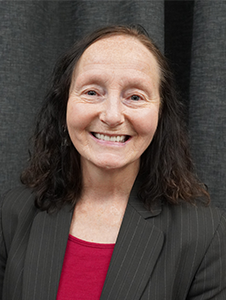
Associate Professor Helen Roberts
The UKCGE recognises the importance of championing postgraduate education and research, Associate Professor Roberts says.
“Getting recognition from an international educational body that seeks to promote high quality postgraduate education is a fantastic achievement that I very much appreciate,” she says.
Associate Professor Roberts has supervised 60 postgraduate students, including honours, MBA, MBus, DBA and PhD students, and experienced a range of different challenges as a supervisor.
“Stopping to take time to communicate what I have gained from these opportunities has helped me to better understand my role as a supervisor and added perspective to my supervision responsibility.”
Like Associate Professors Sole and Das, Associate Professor Roberts found assembling her portfolio a great way to reflect on how she supervises, and to understand which of her techniques work well in managing students - from very early in their PhD, to the latter stages of the thesis when they are close to completion.
“It took time to think about what it is that I do as a supervisor and how that impacts on the student and the research journey throughout the PhD.”
The portfolio required about a week of writing but was then revised to clearly articulate her supervisory input from the candidate selection stage, investigating possible research questions, encouraging students to write, all the way through to the final thesis submission deadline.
From a career perspective, recognition of her high-quality postgraduate supervision affirms the work she is doing as a supervisor and is also a welcome credit to add to her CV, she says.
She thanks the Research Supervision Recognition Programme for giving her the opportunity to apply for the award and hopes it might inspire other supervisors at Otago to also seek recognition from the UKCGE for the contribution they make to supervision at Otago.
Reflection results in improvement
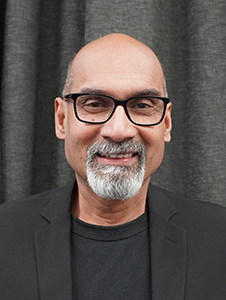
Associate Professor Vijay Mallan
Supervisor recognition often comes as a result of student nominations, Associate Professor Mallan says.
At Otago, OUSA and the Graduate Research School organise the annual supervisor awards, where students nominate a supervisor.
What makes UKCGE certification different is supervisors seek the recognition themselves, by submitting a 5000-word-long portfolio based on their own practises.
These practises are benchmarked with the UKCGE Best Practises Supervisory Framework, and this framework is informed by the academic research in doctoral education.
“So they write about their practise and at the same time they also reflect on their practise, and they refer to the literature. As a result of the reflection, there is an improvement in the practise.”
Two international reviewers from the UKCGE assess the applications.
“When supervisors gain this recognition, it is a clear indication that their work is definitely based on good practise, and they, of course, feel more confident.”
It was good for a department to have supervisors recognised as well, because this recognition will be an indicator of high-quality supervision by prospective students, institutions, and research funders. It could then potentially be helpful in recruitment, promotion, mobility between institutions, and winning research funding.
Associate Professor Mallan mentored each of the three supervisors, saying it took them a few weeks to put their application together. The certification is offered three times a year, and if someone wasn’t successful the first time they tried, the UKCGE would offer feedback on how to improve their application. After six months, they could reapply.
HEDC provides support for supervisor applying for UKCGE recognition, he says.
